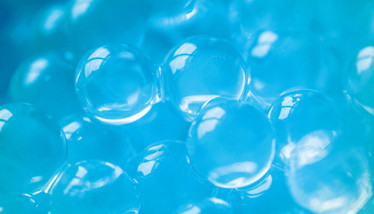Special Delivery
A novel protein-engineered hydrogel offers a less toxic sustained release alternative to synthetic platforms

“Hydrogels are essentially 3D polymer networks,” explains Jin Kim Montclare, Professor of Chemical and Biomolecular Engineering at New York University’s (NYU’s) Tandon School of Engineering. “They have the capacity to encapsulate small molecules, but they can also transition between gel and solution states, which liberates specific compounds into the internal environment in response to stimuli like temperature and acidity.”
Though academic research has previously demonstrated the ability of synthetically produced hydrogels to be used for drug loading and controlled release, such technologies are often associated with toxic crosslinkers. Montclare says that the protein-engineered gel developed by her team demonstrates the capacity to load and deliver drugs without the risk of harm, as protein hydrogels are more biocompatible than synthetic hydrogels (1).
When exposed to the high temperatures of the internal environment (37 °C), the team’s “upper critical solution temperature” (UCST) hydrogel quickly returns to its solution state, allowing for rapid release of any loaded drugs. Ultimately, the aim is to eventually develop protein hydrogels that respond to specific temperatures for different drug delivery applications.
“This is the first thermo-responsive protein hydrogel based on a single coiled-coil protein that transitions from solution to gel at low temperatures through a process of self-assembly, without the need for external agents,” says Montclare. “The majority of hydrogels in development have a lower critical solution temperature and, though they are completely miscible at temperatures below a critical value and can be molded into nanoparticles, films and coatings for pharmaceutical use, their solubility decreases as the temperature of a given environment rises.”
When the team bound curcumin to their hydrogel, it remained stable at a physiological temperature for two weeks, allowing for sustained drug release. Because the drug leaves the hydrogel mainly through diffusion, the team were limited as to how much control they could exert over release. “The drug release is controlled in the sense that we were able to control the amount of drug product used. However, we'd have to do more studies to see if or how the release is affected at different loading concentrations of curcumin,” Montclare adds.
The team now plans to investigate how fluorination of the gel’s hydrophobic pore could further improve its thermostability, and will gain more understanding of the effects of pH and ionic strength. “We’ve also partnered with the Air Force Research Laboratory to further our understanding of the mechanisms behind gelation and are also working in collaboration with other organizations to use our hydrogel as a delivery vehicle to accelerate wound healing in diabetic mice,” says Montclare.
- JK Montclare, “Thermoresponsive Protein-Engineered Coiled-Coil Hydrogel for Sustained Small Molecule Release”, Biomacromolecules, 3340-3351 (2019).
After finishing my degree, I envisioned a career in science communications. However, life took an unexpected turn and I ended up teaching abroad. Though the experience was amazing and I learned a great deal from it, I jumped at the opportunity to work for Texere. I'm excited to see where this new journey takes me!



















